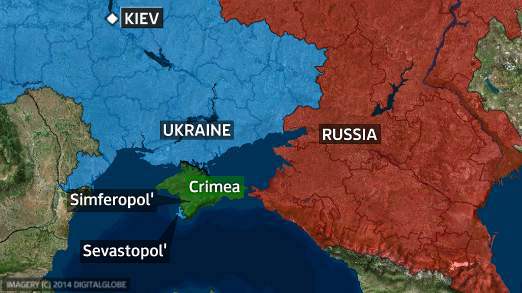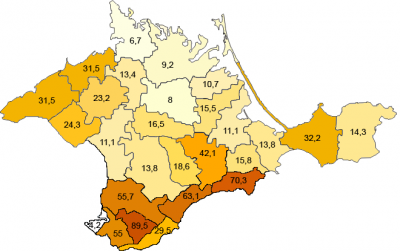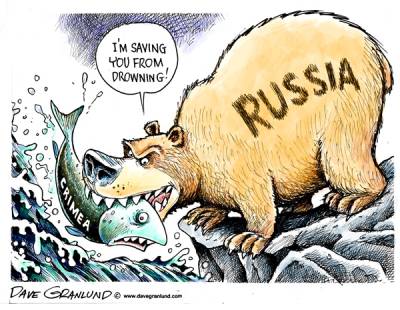It’s always surprising how many people in the Western democracies fall for the propaganda of totalitarian governments – and admire those countries while condemning their own governments for the shortcomings those have. They compare apples to oranges without seeing that they do so.

This happening now again around the Crimea crisis. There are plenty voices that don’t see through the tricks of the Russian government. They blindly repeat arguments as: this split is democratic, Crimea belongs to Russia and Russia has every right to make Crimea part of Russia.
But let’s have a closer look into those arguments!
Isn’t it democratic? Well – there are several arguments why it isn’t. Here are just 3 of those:
First of all: democracy is not the dictatorship of the majority but is about the protection of the minorities. But exactly the minorities and there needs are neglected in this case – with the most prominent case of the Crimean tartars that might be forced to live in Russia against their will.
Secondly: how legitimate is the regional government? The regional parliament installed a pro-Russian government and sacked the old one after Russian gunmen had taken over control. How democratic is it if any opposing voices are threatened? And how does this relate to the fact that the same people follow the Russian argument that sacking Yanukovych was illegitimate? IF the first is legitimate – how can the latter not be? Especially as in the latter case the decision has not been taking at gunpoint and the parliament decided also that an election will be held to give people a voice to form a new government whereas in the first case this self-installed government takes far-reaching decisions without seeking legitimation.
Thirdly – yes, a referendum can be a good way to decide on issues. But a referendum with such far-reaching consequences needs a good preparation. People have to be well-informed so that they are aware of all the consequences. And it needs a plan how rights of the people with the minority opinion will be protected in the future situation. Furthermore people have be able to cast a free vote without feeling harassed or bullied for having a different opinion. All those conditions are not met in the current situation. This is an overhasty move, not prepared at all, people have no ideas of the consequences, there is no plan for minorities and how can you cast a free vote under military presence of an occupying force? Any outcome will be influenced by the new reality created by Russia and will not be a free vote.
Ok – maybe it’s not democratic, but doesn’t Crimea just belong to Russia?
A look into the history does not give a strong support for this. Crimea used to be inhabited mainly by tartars and as most parts of Europe it had been sometimes  independent and sometimes part of various empires. The longest continuous streak was actually the period when Crimea was part of the Ottoman Empire – for 333 years (1441-1774). It became part of Russia only after the Russian empress Catherine the Great annexed it in 1783 – after a 9 year stint as independent Khanate. And that Crimea has now a majority of Russian natives is mostly the result of the deportation of the Crimean tartars by Stalin in 1944. In 1954 it become an independent region of the soviet-federation state Ukraine – by decree of Khrushchev and in 1992 Crimea decided to join the newly independent state of Ukraine. So does it really belong to Russia – besides the question if a country can claim at all a certain territory? With such an argument nearly every country in Europe could claim other territories.
independent and sometimes part of various empires. The longest continuous streak was actually the period when Crimea was part of the Ottoman Empire – for 333 years (1441-1774). It became part of Russia only after the Russian empress Catherine the Great annexed it in 1783 – after a 9 year stint as independent Khanate. And that Crimea has now a majority of Russian natives is mostly the result of the deportation of the Crimean tartars by Stalin in 1944. In 1954 it become an independent region of the soviet-federation state Ukraine – by decree of Khrushchev and in 1992 Crimea decided to join the newly independent state of Ukraine. So does it really belong to Russia – besides the question if a country can claim at all a certain territory? With such an argument nearly every country in Europe could claim other territories.
Ok – then the last argument: Russia has every right to do so – the US would do the same in their own influence sphere.
It would be worth discussing if the US really behave the in the same way – but that would only distract from the core of this argument. This argument basically says: if another person breaks the law, I have the right to break the law too. Thinking this through this principle would mean the end of law and justice – as any misdeed gives other the right to do the same. To relate it to people and not to states: it would mean nothing different from that one murder gives everyone the right to kill others as well. Misbehaviour of one party is no excuse – and gives certainly not the right to others to do the same.
It’s time for people to wake up and to use their brains. There is a lot of propaganda in this case  – and not only from one side. You’ve got a brain so that you can build your own opinion – don’t let others take that job from you. Look further and go deeper than the first layer. Challenge arguments. A better world and functioning democracies need people that think for themselves and not followers of the first best argument.
– and not only from one side. You’ve got a brain so that you can build your own opinion – don’t let others take that job from you. Look further and go deeper than the first layer. Challenge arguments. A better world and functioning democracies need people that think for themselves and not followers of the first best argument.
In the Crimean case it’s time to stand up against what is going on there and the politics of Putin. In the current situation there is no legitimate case for Crimea joining Russia.
But what to do? This is obviously difficult – as there need to be talks to keep lines open for a solution. But we also have to voice our opinion and to show strength, not in a military sense, but with sanctions. And if that might hurt our economy a bit – so be it. It can’t be that economic growth is more important that human right and (international) law!